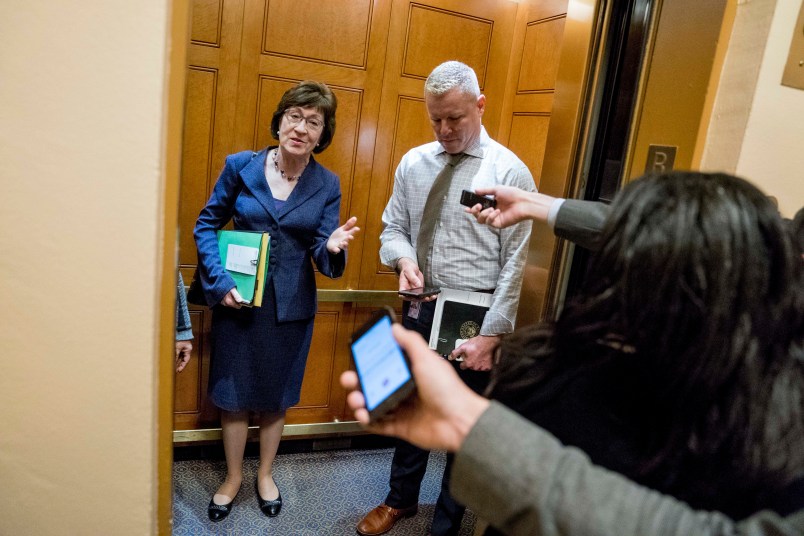The morning after casting her vote for a tax bill that kills Obamacare’s individual mandate, Sen. Susan Collins (R-ME) put out a statement saying the health care policies she demanded in exchange for her vote will not be considered at all this year.
One bill would to restore government subsidies to insurance companies, known as cost sharing reduction (CSR) payments, that the Trump administration cut off earlier this year. Another would set up a temporary federal reinsurance program aimed at lowering premiums. Collins’ third demand was a waiver of deep automatic cuts to Medicare and other federal programs triggered by the $1.4 trillion price tag of the tax cuts passed this week.
Now, it appears all three demands will not be met this year.
“It has become clear that Congress will only be able to pass another short-term extension to prevent a government shutdown and to continue a few essential programs,” Collins said in a joint statement with Sen. Lamar Alexander (R-TN), who co-sponsored legislation to restore CSR payments.
“There is every reason to believe that these important provisions can and will be delivered as part of a bipartisan agreement” in January, the lawmakers added.
Collins had originally insisted that the policies—which she argued would mitigate the damage done to the nation’s health care markets by repealing the individual mandate and would prevent deep cuts to Medicare—be passed and signed into law before she cast her vote on the tax bill.
“I’m going to know by the time the tax bill comes back from conference if those provisions made it,” she told reporters at a breakfast in late November. “That’s hugely important.”
Collins cast her vote late Tuesday night, however, without knowing if her health care bills would even receive a vote, let alone become law. Despite signals from House Republicans that the policies to stabilize Obamacare’s individual market would be dead on arrival in their chamber, Collins continued to express optimism that her demands would make it into the continuing resolution to fund the government that must pass before midnight on Friday in order to avoid a shutdown.
Now, while acknowledging that will not be the case, Collins and Alexander insist the policies will instead become law in January, citing promises from House Speaker Paul Ryan (R-WI) and Senate Majority Leader Mitch McConnell (R-KY).
“It looks like the Christmas present of lower health insurance premiums will now have to be a Valentine’s Day present,” Alexander said. “I am confident that after the first of the year members of both houses will be eager to include our legislation in what was to have been the year-end package of bills.”
House Republicans, however, have been anything but “eager” to support these policies. Earlier this week, several told TPM that they do not want to take any step seen as “upholding a system that we all oppose.”
Even if the restoration of CSR payments does happen next year, health care experts say it will not outweigh the damage done to the individual market by killing the individual mandate, and may in fact do more harm than good. When the Trump administration cut off the subsidies earlier this year, the vast majority of people in the individual market were protected from premium increases by the Affordable Care Act’s subsidy structure. Millions of people actually had access to better and cheaper plans than in previous years due to how state insurance officials adjusted their programs in response to President Trump’s decision to halt the subsidies. (Some un-subsidized Americans did see painful price hikes, however). Adding the CSR payments back in now could cause even more disruption in a market that has only just adjusted to its new normal.
And while Collins’ other bill—funding state reinsurance programs—would help bring down premiums after they rise due to the repeal of the individual mandate and the shrinking of the risk pool, neither policy would prevent millions more people from becoming uninsured with the mandate’s repeal.
As for Collins’ third demand, Republicans have indicated that they will push off a decision on to handle the automatic Medicaid cuts—triggered due to Congress’ PAYGO law and the $1.4 trillion tax bill—until next year, buying some time and eroding any Democratic leverage by having Trump sign the tax bill early next year instead of this week.







Or next year, or the year after that, etc.
Kinda slow on the old uptake, aren’t we?
Or any year. But you knew that. You just didn’t care.*
######*this comment is sexist
So is she being sexist in pointing out she failed.
Correction: After Backing Tax Bill, Collins Says Her Demands Won’t Be Voted DOWN This Year. They’ll wait until next year to officially laugh at all of her demands.
The stoopid… it burns…